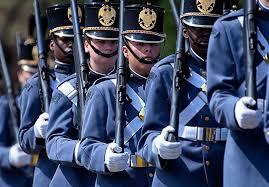The Prestigious Degrees Offered at the United States Military Academy
The United States Military Academy, also known as West Point, is renowned for its rigorous academic programs and its commitment to developing leaders of character. Graduates of West Point earn a Bachelor of Science degree in one of several disciplines, setting them on a path to success in both military and civilian careers.
Bachelor of Science Degrees
At West Point, cadets can choose from a variety of majors, including:
- Engineering (Civil Engineering, Mechanical Engineering, Electrical Engineering, etc.)
- Mathematics
- Foreign Languages (Arabic, Chinese, Spanish, etc.)
- Economics
- History
- Political Science
- Psychology
- and many more…
In addition to their major field of study, cadets also complete a core curriculum that includes courses in leadership development, military science, physical education, and ethics. This comprehensive education prepares graduates to excel in a wide range of fields and professions.
Career Opportunities for Graduates
Graduates of the United States Military Academy go on to serve as officers in the U.S. Army, where they lead soldiers in defense of the nation’s security. Many West Point graduates also pursue careers in fields such as engineering, business, law, medicine, and government service.
The education and training received at West Point equip graduates with the skills and values necessary to succeed in any endeavor they choose to pursue. The strong sense of duty and commitment instilled at the Academy sets West Point graduates apart as leaders who are ready to face any challenge with courage and integrity.
If you are considering a career in the military or seeking a top-tier education that emphasizes leadership development and character building, the United States Military Academy may be the perfect choice for you.
Top 8 Benefits of Earning a Degree from the United States Military Academy
- 1. Rigorous academic programs that challenge and develop critical thinking skills.
- 2. Prestigious institution with a long history of producing successful leaders.
- 3. Strong emphasis on leadership development and character building.
- 4. Diverse range of majors to choose from, including engineering, mathematics, and foreign languages.
- 5. Comprehensive education that includes military science, physical education, and ethics courses.
- 6. Graduates earn a Bachelor of Science degree in their chosen field of study.
- 7. Career opportunities in the U.S. Army as officers or in various civilian fields such as business, law, and government service.
- 8. Strong sense of duty and commitment instilled in graduates, preparing them for success in any endeavor.
7 Drawbacks of Pursuing a Degree at the United States Military Academy
- Limited flexibility in choosing majors compared to civilian universities.
- Rigorous academic and military training can be physically and mentally demanding.
- Strict disciplinary standards and regulations may feel restrictive to some individuals.
- High level of competition among cadets for leadership positions and academic achievements.
- Limited social life due to intense schedule and military obligations.
- Transitioning from a highly structured environment at the Academy to civilian life post-graduation can be challenging for some graduates.
- Potential deployment or relocation requirements as part of military service after graduation.
1. Rigorous academic programs that challenge and develop critical thinking skills.
The United States Military Academy offers rigorous academic programs that challenge and cultivate critical thinking skills in its cadets. Through a demanding curriculum that includes a wide range of disciplines, cadets are pushed to think analytically, solve complex problems, and make sound decisions. This emphasis on critical thinking not only prepares cadets for success in their military careers but also equips them with valuable skills that are highly sought after in various civilian professions. The rigorous academic environment at West Point fosters intellectual growth and resilience, shaping graduates into well-rounded leaders capable of navigating challenges with confidence and precision.
2. Prestigious institution with a long history of producing successful leaders.
The United States Military Academy stands as a prestigious institution with a rich history of cultivating successful leaders. For over two centuries, West Point has been at the forefront of developing individuals who exemplify excellence in leadership, integrity, and service to their country. Graduates of the Academy have gone on to achieve remarkable success in both military and civilian sectors, making significant contributions to society and upholding the values instilled within them during their time at West Point. The legacy of producing exceptional leaders is a testament to the enduring impact of a United States Military Academy degree.
3. Strong emphasis on leadership development and character building.
The United States Military Academy stands out for its strong emphasis on leadership development and character building. Through a rigorous curriculum and hands-on training, cadets at West Point are groomed to become principled leaders with a deep sense of integrity and commitment. The focus on leadership skills not only prepares graduates for successful military careers but also equips them to excel in various civilian professions. This emphasis on developing well-rounded individuals with strong moral values sets West Point graduates apart as capable leaders who inspire trust and respect in any setting.
4. Diverse range of majors to choose from, including engineering, mathematics, and foreign languages.
One notable advantage of pursuing a degree at the United States Military Academy is the diverse range of majors available for cadets to choose from. Whether a cadet’s passion lies in engineering, mathematics, or foreign languages such as Arabic or Chinese, West Point offers a comprehensive selection of academic disciplines to cater to a variety of interests and career aspirations. This diversity in majors not only allows cadets to pursue their academic passions but also provides them with a well-rounded education that prepares them for success in both military and civilian endeavors.
5. Comprehensive education that includes military science, physical education, and ethics courses.
One significant advantage of earning a degree from the United States Military Academy is the comprehensive education it provides. Cadets at West Point undergo a well-rounded academic experience that goes beyond traditional classroom learning. By incorporating military science, physical education, and ethics courses into the curriculum, cadets gain a holistic understanding of leadership, physical fitness, and ethical decision-making. This unique approach equips graduates with not only academic knowledge but also practical skills and values that are essential for success in both military and civilian life.
6. Graduates earn a Bachelor of Science degree in their chosen field of study.
One significant advantage of attending the United States Military Academy is that graduates earn a Bachelor of Science degree in their chosen field of study. This rigorous academic program ensures that cadets receive a high-quality education while also preparing them for leadership roles in both military and civilian sectors. By obtaining a Bachelor of Science degree from West Point, graduates have a strong foundation in their respective fields, setting them up for success in their future careers and endeavors.
7. Career opportunities in the U.S. Army as officers or in various civilian fields such as business, law, and government service.
One significant advantage of earning a degree from the United States Military Academy is the wide array of career opportunities it opens up for graduates. Upon completion of their education at West Point, cadets have the opportunity to serve as officers in the U.S. Army, leading soldiers and contributing to national defense. Additionally, graduates are well-equipped to pursue careers in various civilian fields such as business, law, and government service. The strong foundation in leadership, critical thinking, and ethical decision-making provided by a West Point education prepares graduates for success in a diverse range of professions, both within and outside the military sector.
8. Strong sense of duty and commitment instilled in graduates, preparing them for success in any endeavor.
Graduates of the United States Military Academy benefit from a strong sense of duty and commitment instilled during their education, which prepares them for success in any endeavor they choose to pursue. This unwavering dedication to service and excellence equips West Point graduates with the resilience, integrity, and leadership skills needed to overcome challenges and achieve their goals, whether in military service or civilian careers. The emphasis on duty and commitment at the United States Military Academy sets its graduates apart as principled leaders who approach every task with determination and honor.
Limited flexibility in choosing majors compared to civilian universities.
One con of pursuing a degree at the United States Military Academy is the limited flexibility in choosing majors compared to civilian universities. At West Point, cadets are required to select a major from a predetermined list of disciplines, primarily focused on technical fields and military-related subjects. This lack of flexibility may restrict students who have a strong interest in pursuing non-traditional or specialized fields of study that are not offered at the Academy. As a result, cadets may feel constrained in their academic pursuits and miss out on exploring a broader range of disciplines that could align better with their career aspirations outside of the military.
Rigorous academic and military training can be physically and mentally demanding.
One significant drawback of pursuing a degree at the United States Military Academy is the intense physical and mental demands of the rigorous academic and military training. Cadets at West Point undergo strenuous physical training regimens, challenging academic coursework, and demanding military drills that can take a toll on their physical and mental well-being. The high expectations and constant pressure to perform at a high level in both academic and military settings can be overwhelming for some individuals, leading to stress, fatigue, and burnout. Balancing the demanding schedule of academic classes, military obligations, physical fitness requirements, and extracurricular activities can be a daunting task for cadets at the United States Military Academy.
Strict disciplinary standards and regulations may feel restrictive to some individuals.
One potential con of pursuing a degree at the United States Military Academy is the strict disciplinary standards and regulations that cadets are required to adhere to. While these standards are essential for fostering discipline, leadership, and accountability, they may feel overly restrictive to some individuals. The structured environment and rigorous rules can be challenging for those who prefer more autonomy and flexibility in their academic and personal lives. It requires a high level of commitment and adherence to the military code of conduct, which may not be suited for everyone’s preferred lifestyle or learning style.
High level of competition among cadets for leadership positions and academic achievements.
One significant drawback of pursuing a degree at the United States Military Academy is the intense level of competition among cadets for leadership positions and academic achievements. The rigorous environment fosters a culture where cadets constantly vie for top positions and strive to outperform their peers academically. This high level of competition can create a stressful and demanding atmosphere, potentially leading to increased pressure on cadets to excel at all costs. Additionally, the competitive nature of the Academy may hinder collaboration and teamwork among cadets, as individuals may prioritize personal success over collective achievement.
Limited social life due to intense schedule and military obligations.
One significant drawback of pursuing a degree at the United States Military Academy is the limited social life that cadets experience due to the demanding schedule and military obligations. The rigorous academic curriculum, combined with military training and responsibilities, leaves little time for extracurricular activities and socializing. Cadets often have to prioritize their studies and training over social events, leading to a more isolated and regimented lifestyle during their time at West Point. This limitation on social interactions can impact personal relationships and the overall college experience for cadets, as they must balance academic excellence with military duties, leaving little room for leisure activities or socializing outside of their tightly structured routine.
Transitioning from a highly structured environment at the Academy to civilian life post-graduation can be challenging for some graduates.
Transitioning from a highly structured environment at the United States Military Academy to civilian life post-graduation can be challenging for some graduates. The strict discipline, rigorous schedules, and clear hierarchies that define life at the Academy may not necessarily align with the more fluid and less regimented nature of civilian society. Graduates who are accustomed to following orders and adhering to a strict code of conduct may find it difficult to navigate the complexities of decision-making and autonomy in civilian life. This adjustment period can pose challenges in terms of adapting to new social norms, work environments, and personal freedoms that may not have been as prevalent during their time at the Academy.
Potential deployment or relocation requirements as part of military service after graduation.
One significant con associated with earning a degree from the United States Military Academy is the potential deployment or relocation requirements that graduates may face as part of their military service after graduation. Upon completing their education at West Point, graduates are commissioned as officers in the U.S. Army and may be assigned to various duty stations around the world, which could involve deployments to conflict zones or remote locations. This aspect of military service can disrupt personal and family life, making it challenging for some individuals to maintain stability and continuity in their careers and relationships. The uncertainty of future assignments and the demands of military service can be a deterrent for those who prioritize stability and predictability in their post-graduation plans.




